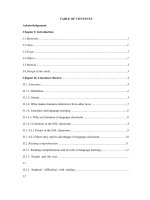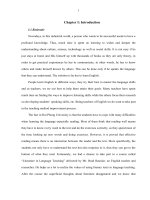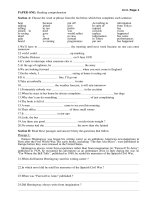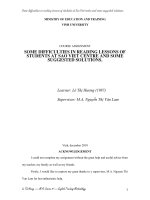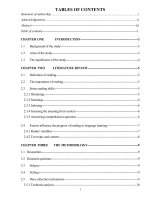Reading 2
Bạn đang xem bản rút gọn của tài liệu. Xem và tải ngay bản đầy đủ của tài liệu tại đây (38.67 KB, 4 trang )
A Read the following passage, then choose the correst answers.
Every culture in the would has marriage and wedding ceremonies. Usually
marriages are between one woman (the bride) and one man (the groom).
However, in other parts of the world a man may have saveral wives,or, as in
some areas of Tibet and India, a wife may have more than one husband.
There are also many different kinds of wedding ceremonies practiced around
the world . These eremonies can be very short and simple, or very long and
complicated.
One of the largest and most expensive wedding ceremonies in recent times
was held in Dubai in 1981. The couple tying the knot at this wedding were the
son of Sheik Rashid Bin Saeed Al Maktoum and Princess Salama. The wedding
ceremony took seven days cost 44 million dollars. It was held in a large
building which was specially built for the ceremony and looked like a stadium.
The bride and the groom needed a large place for their wedding because more
than 20,000 guests were invited.
The reasons why a man and a woman get married also vary. Sometimes
they marry because they are in love, sometimes they marry someone they
meet through a matchmaker, and sometimes they marry because their parents
tell them that they must marry.
One unusual example of an arranged marriage took place in Bangladesh in
1986. The groom was an eleven-month-old boy and the bride was a threemonth-old girl. They were the youngest married couple ever.
The parents of the bride and groom arranged the marriage as a way of
ending a fight between the two families who had been arguing over a farm for
twenty years. Both families thought that they owned the farm, but no one
knew exactly. The fight ended for good when the young boy married the
young girl. By arranging this marriage, neither family was forced to lose face.
The two families agreed to give the farm to the young couple.
1. What is the best title for this passage?
A. An Unusual Wedding Tradition
B. A Short History of Marrige
C. Common Western Wedding Tradition
D. Interesting Wedding Around the World
2. The word “complicated” could be replaced by
A. expensive
B. formal
C. noisy
D. confusing
3. Who got married in the large wedding ceremony described in the passage?
A. a sheik and a princess
B. a son of sheik and a princess
C. a famer and a neighbor
D. a king and a queen
4. Which statement is wrong?
A. Men may have more than one wife in Tibet and India.
B. The women who gets married is called a bride.
C. Princess Salama’s wedding cost over 40 million dollars.
5.
6.
7.
8.
D. Some marriage are arranged by parents.
Why was the wedding ceremony in Dubai held in a building like a stadium?
A. The ceremony was very long.
B. Many people came to the wedding.
C. The groom loved to play sports.
D. People in Dubai usually get married in stadiums.
Why did the families in Bangladesh made their children get married?
A. The children were in love.
B. The families wanted to buy a farm.
C. The families wanted to end a fight.
D. The bride’s family wanted to sell their farm.
What was strange about the wedding in Bangladesh?
A. The bride and the groom were young.
B. It was an arranged marriage.
C. The wedding was held after a fight.
D. More than 20,000 guests came to the wedding.
The word “sheik” means
A. a general
B.an Arabian emperor
C. a male Arab ruler
D.the President
B
Millions of people are using cellphones today. In many places, it is
actually considered unusual not to use one. In many countries, cellphones are
very popular with young people. They find that the phones are more than a
means of communication - having a mobile phone shows that they are cool
and connected.
The explosion in mobile phone use around the world has made some health
professionals worried. Some doctors are concerned that in the future many
people may suffer health problems from the use of mobile phones. In England,
there has been a serious debate about this issue. Mobile phone companies are
worried about the negative publicity of such ideas. They say that there is no
proof that mobile phones are bad for your health.
On the other hand, medical studies have shown changes in the brain cells of
some people who use mobile phones. Signs of change in the tissues of the
brain and head can be detected with modern scanning equipment. In one
case, a traveling salesman had to retire at young age because of serious
memory loss. He couldn't remember even simple tasks. He would often forget
the name of his own son. This man used to talk on his mobile phone for about
six hours a day, every day of his working week, for a couple of years. His
family doctor blamed his mobile phone use, but his employer's doctor didn't
agree.
What is it that makes mobile phones potentially harmful? The answer is
radiation. High-tech machines can detect very small amounts of radiation from
mobile phones. Mobile phone companies agree that there is some radiation,
but they say the amount is too small to worry about.
As the discussion about their safety continues, it appears that it's best to use
mobile phones less often. Use your regular phone if you want to talk for a long
time. Use your mobile phone only when you really need it. Mobile phones can
be very useful and convenient, especially in emergencies. In the future, mobile
phones may have a warning label that says they are bad for your health. So
for now, it's wise not to use your mobile phone too often.
11. According to the passage, cellphones are especially popular with young
people because _____________.
A. they are indispensable in everyday communications
B. they make them look more stylish
C. they keep the users alert all the time
D. they cannot be replaced by regular phones
12. The changes possibly caused by the cellphones are mainly concerned with
_______________.
A. the mobility of the mind and the body
B. the smallest units of the brain
C. the arteries of the brain
D. the resident memory
13. The word "means" in the passage most closely means ______.
A. “meanings”
B. “expression” C. “method”
D. “transmission”
14. The word "potentially" in the passage most closely means ______.
A. “obviously”
B. “possibly”
C. “certainly”
D. “privately”
15. "Negative publicity" in the passage most likely means ______.
A. information on the lethal effects of cellphones
B. widespread opinion about bad effects of cellphones
C. the negative public use of cellphones
D. poor ideas about the effects of cellphones
16. Doctors have tentatively concluded that cellphones may ________.
A. damage their users’ emotions
B.cause some mental malfunction
C. change their users’ temperament
D.change their users’ social behaviours
17. The man mentioned in the passage, who used his cellphone too often,
_____________.
A. suffered serious loss of mental ability
B. could no longer think lucidly
C. abandoned his family
D. had a problem with memory
18. According to the passage, what makes mobile phones potentially harmful
is ______.
A. their radiant light
B. their power of attraction
C. their raiding power
D. their invisible rays
19. According to the writer, people should ______.
A. only use mobile phones in urgent cases
B. only use mobile phones in medical emergencies
C. keep off mobile phones regularly
D. never use mobile phones in all cases
20. The most suitable title for the passage could be ______.
A. “The Reasons Why Mobile Phones Are Popular”
B. “Technological Innovations and Their Price”
C. “The Way Mobile Phones Work”
D. “Mobile Phones. A Must of Our Time”

